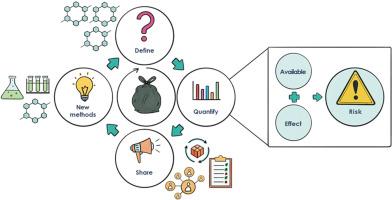Understanding how chemical risk can be managed in a circular economy
IF 10.9
1区 环境科学与生态学
Q1 ENGINEERING, ENVIRONMENTAL
引用次数: 0
Abstract
Achieving a circular economy is dependent on our ability to safely reuse materials that would otherwise be classed as waste. This paper outlines challenges facing Australia in the context of international research trends for waste and waste reuse in a circular economy. Our understanding of the potential chemical hazards contained in our wastes and products with recycled content is a challenge due to the variability of waste and product materials. Such variability amplifies the need to ensure representative sampling to expand analytical and experimental methods and establish fundamental data and information related to chemical availability and ecological and human health effect. Four key themes are identified that need consideration, from identification of chemicals in our ever-diverse waste streams to dissemination of outcomes as guidance and for uptake in policy. Gaps in knowledge and the research required to address the four themes are outlined. The long-term development of an acceptable and consistent set of guiding principles related to the sampling, characterisation, categorisation and safe reuse of waste is shown to be important, further enabling resource recovery and reuse of materials.

了解如何在循环经济中管理化学品风险
实现循环经济取决于我们安全再利用材料的能力,否则这些材料将被归类为废物。本文概述了澳大利亚在循环经济中废物和废物再利用的国际研究趋势背景下面临的挑战。由于废物和产品材料的可变性,我们对含有回收成分的废物和产品中含有的潜在化学危害的理解是一项挑战。这种可变性使我们更加需要确保有代表性的抽样,以扩大分析和实验方法,并建立与化学品可得性以及对生态和人类健康的影响有关的基本数据和信息。确定了需要考虑的四个关键主题,从确定我们日益多样化的废物流中的化学品到传播作为指导的成果并纳入政策。概述了解决这四个主题所需的知识差距和研究。就废物的抽样、特征、分类和安全再用,长期制订一套可接受和一致的指导原则是很重要的,这将进一步促进资源回收和材料再用。
本文章由计算机程序翻译,如有差异,请以英文原文为准。
求助全文
约1分钟内获得全文
求助全文
来源期刊

Resources Conservation and Recycling
环境科学-工程:环境
CiteScore
22.90
自引率
6.10%
发文量
625
审稿时长
23 days
期刊介绍:
The journal Resources, Conservation & Recycling welcomes contributions from research, which consider sustainable management and conservation of resources. The journal prioritizes understanding the transformation processes crucial for transitioning toward more sustainable production and consumption systems. It highlights technological, economic, institutional, and policy aspects related to specific resource management practices such as conservation, recycling, and resource substitution, as well as broader strategies like improving resource productivity and restructuring production and consumption patterns.
Contributions may address regional, national, or international scales and can range from individual resources or technologies to entire sectors or systems. Authors are encouraged to explore scientific and methodological issues alongside practical, environmental, and economic implications. However, manuscripts focusing solely on laboratory experiments without discussing their broader implications will not be considered for publication in the journal.
 求助内容:
求助内容: 应助结果提醒方式:
应助结果提醒方式:


